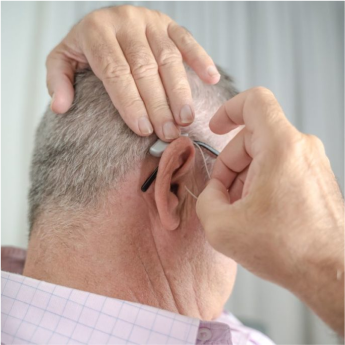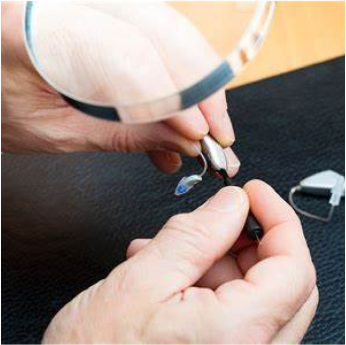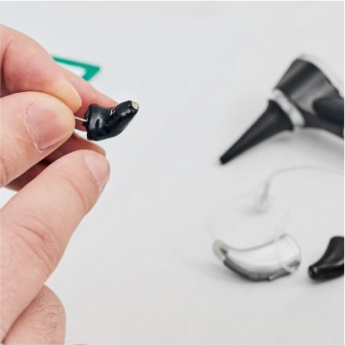Hearing Aid Repair
Professional Hearing Aid Repair Services
Comprehensive Care to Keep Your Devices Working
At Whittaker Hearing Center, we offer a full range of hearing aid repair services to address any issues that can’t be fixed at home. Whether your hearing aid is malfunctioning, damaged, or just in need of a tune-up, our expert team can help. We service most major hearing aid brands, and our repairs are designed to extend the life of your device.
Regular professional maintenance is crucial for keeping your hearing aids in top condition. Our repairs include checking the internal components, cleaning the device thoroughly, and replacing any worn parts. We’ll make sure your hearing aids are working properly so you can continue to hear clearly and confidently.

Why Professional Repairs Are Important
Extend the Life of Your Hearing Aids
While minor fixes can be done at home, professional repair and maintenance are essential to ensure your hearing aids stay in good working order. Over time, parts can wear out, and issues can arise that require a trained audiologist to address. By bringing your hearing aids in for regular check-ups, we can catch problems early and prevent them from becoming bigger issues later on.
Common Hearing Aid Issues
Hearing aids, like any electronic device, can experience issues over time. While many problems are easy to fix, some require professional attention. Here are some common hearing aid issues you might encounter:
- Feedback or whistling sounds: This occurs when sound leaks out of the hearing aid and is re-amplified by the microphone. It can be caused by a poor fit, earwax buildup, or a malfunctioning device.
- Battery problems: If your hearing aids are not turning on or the sound is weak, the batteries may need to be replaced or recharged.
- Distorted or muffled sound: This can happen due to moisture, earwax, or a malfunction in the device.
- Connectivity issues: Modern hearing aids often connect to smartphones or other devices via Bluetooth, and sometimes these connections can drop or be inconsistent.
If you experience any of these issues, don’t worry—many of them can be easily resolved.


How to Troubleshoot Minor Issues at Home
Quick Fixes You Can Try
Before bringing your hearing aids in for repair, there are a few troubleshooting steps you can try at home:
- Check the batteries: Make sure they’re fresh and properly inserted. If your hearing aid is rechargeable, ensure it’s fully charged.
- Clean the hearing aids: Gently wipe down the device and remove any visible earwax or debris from the microphone and speaker openings.
- Check the fit: Sometimes a poor fit can cause feedback or discomfort. Make sure your hearing aid is seated correctly in your ear.
- Reset Bluetooth connections: If you’re having trouble with connectivity, try resetting the Bluetooth connection on your phone or other devices.
If these steps don’t resolve the issue, it may be time for a professional repair.
Daily Hearing Aid Maintenance Tips
Keep Your Devices in Top Shape
To minimize the need for repairs, it’s important to take good care of your hearing aids on a daily basis. Here are some simple maintenance tips to help prevent common issues:
- Clean your hearing aids regularly: Use a soft, dry cloth to wipe down the exterior of the device and remove any earwax or debris. Avoid using water or cleaning solutions, as moisture can damage the electronics.
- Store them in a safe place: When not in use, keep your hearing aids in a cool, dry place away from direct sunlight or moisture. Consider using a drying box or dehumidifier if you live in a humid environment.
- Check the batteries: Replace disposable batteries as needed or recharge your devices regularly to ensure they’re always ready to use.
Regular check-ups and professional cleanings are also important. At Whittaker Hearing Center, we recommend scheduling routine maintenance appointments to keep your devices functioning at their best.

Repair vs. Replacement
When to Repair and When to Replace
If your hearing aids are malfunctioning, it’s important to consider whether they should be repaired or replaced. Here are a few factors to think about:
- Age of the device: Hearing aids typically last about 5-7 years. If your device is older and starting to have frequent issues, it may be more cost-effective to replace it.
- Cost of repairs: Depending on the severity of the damage, the cost of repairs can vary. In some cases, investing in a new device might make more sense than repairing an old one.
- Technological advancements: Hearing aid technology is constantly improving. If your current device is outdated, upgrading to a newer model with better features may provide a better hearing experience.
At Whittaker Hearing Center, we’ll help you weigh the pros and cons and guide you toward the best decision for your hearing health.
Expert Hearing Care You Can Trust
With over 20 years of experience, Dr. Angela Whittaker is happy to answer any questions you have.
